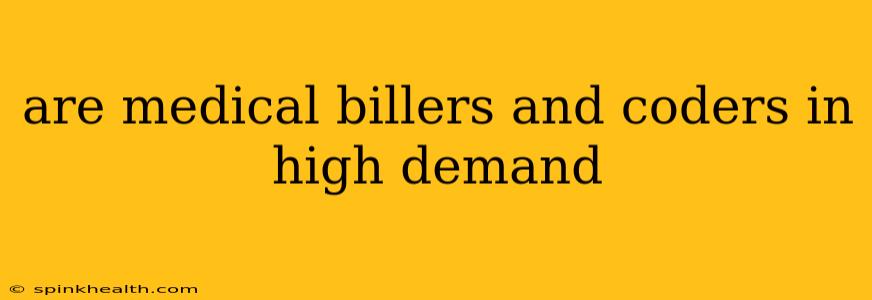Are Medical Billers and Coders in High Demand? A Look at the Evolving Healthcare Landscape
The healthcare industry is a complex and ever-evolving beast. Within its intricate workings, the roles of medical billers and coders are crucial, acting as the unsung heroes ensuring the smooth flow of financial transactions. But are these professionals truly in high demand? The short answer is a resounding yes, but let's delve deeper into why and explore the nuances of this dynamic field.
My name is Sarah, and I've spent the last decade working in healthcare administration, witnessing firsthand the critical role billing and coding professionals play. This experience has provided me with unique insights into the current and future demand for these professionals.
Imagine this: a bustling hospital, doctors diligently tending to patients, nurses providing compassionate care. However, behind the scenes, a different kind of crucial work is happening. Medical billers and coders are the ones who translate the complexities of medical procedures and diagnoses into standardized codes, ensuring accurate billing and timely reimbursements from insurance companies. Without them, the entire system would grind to a halt.
So, why the high demand? Let's explore some key factors:
1. The Aging Population and Rising Healthcare Costs:
As the population ages, the demand for healthcare services increases exponentially. This leads to a surge in medical procedures, diagnoses, and subsequently, the need for skilled professionals to manage the billing and coding processes. The sheer volume of claims necessitates a large workforce capable of handling the increased workload.
2. Increasing Complexity of Healthcare Regulations:
Navigating the intricate web of healthcare regulations, insurance policies, and coding guidelines requires specialized knowledge and expertise. Medical billers and coders must stay updated with the latest changes, ensuring compliance and preventing costly errors. This ongoing need for skilled professionals who can understand and implement these regulations keeps the demand high.
3. Technological Advancements and Electronic Health Records (EHRs):
While technology has streamlined some processes, it has also introduced new complexities. The widespread adoption of EHRs necessitates professionals who can efficiently manage electronic data, understand the intricacies of billing software, and ensure data security. The transition to new technologies requires specialized training and skilled professionals to operate and troubleshoot these systems.
4. High Turnover Rate and Skills Gap:
The healthcare industry often experiences high turnover rates, leading to a continuous need for new hires. This, coupled with a potential skills gap, means employers are actively seeking qualified medical billers and coders to fill vacant positions.
What are the specific skills needed to succeed as a medical biller or coder?
This is a question many prospective candidates ask. The necessary skills go beyond simply knowing codes. Here's a quick overview:
- Proficiency in Medical Terminology and Anatomy: Understanding medical language is paramount for accurate coding.
- Knowledge of ICD-10 and CPT Coding Systems: These are the standardized coding systems used to classify diagnoses and procedures.
- Insurance Claim Processing Expertise: Understanding insurance policies, payer requirements, and claim submission procedures is essential.
- Strong Data Entry and Analytical Skills: Accuracy and attention to detail are crucial for minimizing errors and ensuring timely reimbursements.
- Technical Proficiency: Familiarity with various billing software and EHR systems is highly valued.
- Excellent Communication Skills: Effective communication with physicians, patients, and insurance companies is crucial for resolving issues and ensuring smooth workflows.
Is the future bright for medical billers and coders?
Absolutely! The long-term outlook for this profession remains strong. The aging population, ever-changing healthcare landscape, and technological advancements will continue to drive the need for skilled medical billers and coders for years to come.
In conclusion, the demand for medical billers and coders is high and projected to remain so for the foreseeable future. The skills required are constantly evolving, but the core need for professionals who can navigate the complexities of healthcare billing and coding will only grow stronger. If you're considering a career in this field, now is a great time to explore your options.

